What Are the Best Chemicals to Clean Concrete?
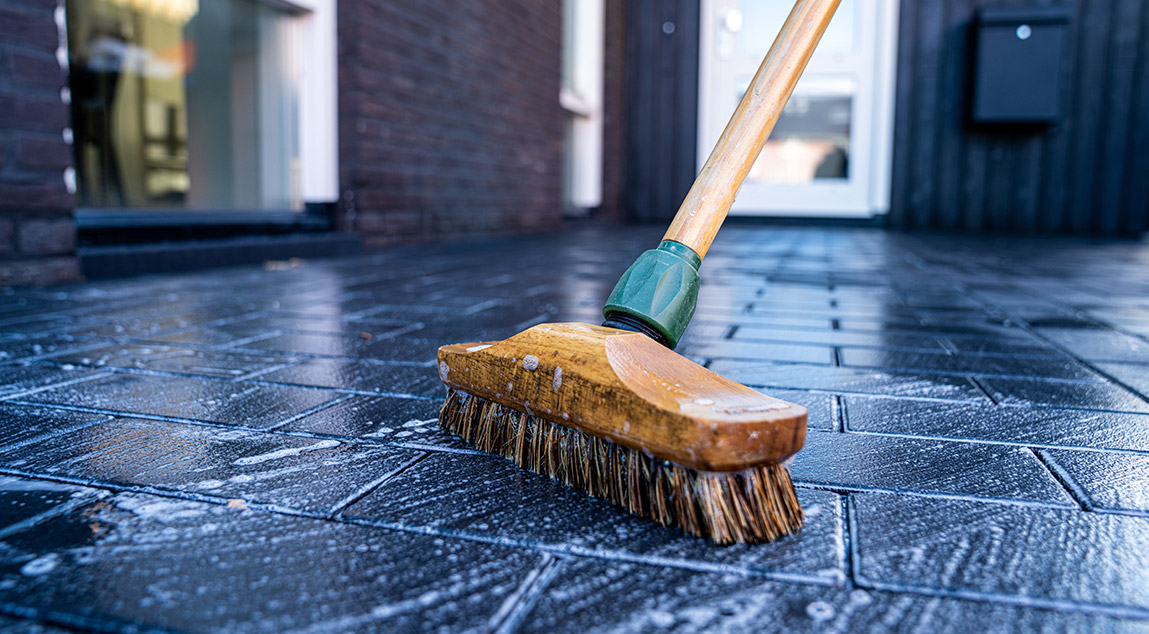
Concrete, known for its durability and versatility, is a staple in various settings, from driveways to patios to sidewalks. Despite its sturdiness, concrete is susceptible to the effects of time, accumulating dirt, grime, and stains that can damage its appearance.
Clean concrete isn’t solely about aesthetics; it’s also crucial for safety. Picture this scenario: you’re hosting an outdoor event, and the last thing you want is someone tripping on a moss-covered concrete floor or dealing with a slippery, grease-stained concrete driveway.
Whether you’re a homeowner striving for a polished property or a business owner conscious of liability concerns, maintaining clean concrete is essential.
We’ll look into concrete cleaning chemicals in the following blog. We’ll explore their effectiveness, weigh their benefits and drawbacks, and offer practical tips to have your concrete surfaces looking brand new.
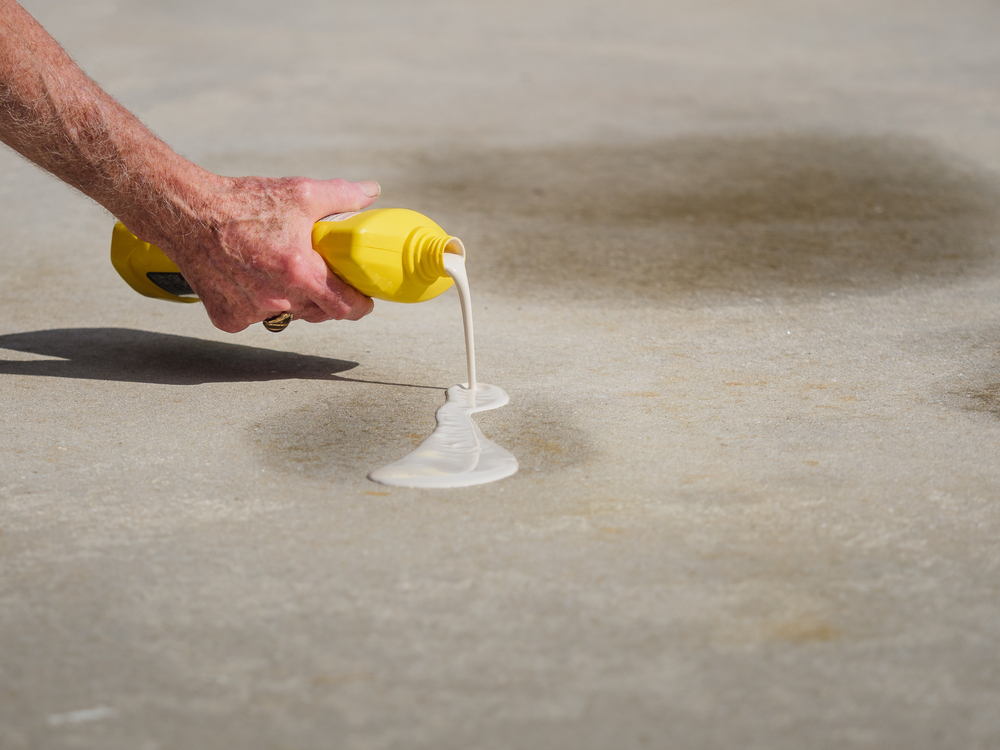
Stains
First, let’s discuss stains on concrete. These unsightly discolorations can occur due to a range of materials, including oil stains, mould, mildew, rust, and paint. Stains on concrete aren’t just a cosmetic concern, either. Left unchecked, they can spell trouble for your trusty concrete surfaces.
Take oil or grease stains as a case in point. They’re not just unsightly, but as the chemical seeps deeper into your concrete slab, it can cause structural damage such as cracking and delamination. Rust stains, on the other hand, isn’t harmful to your concrete surfaces, but it can be difficult to remove.
Moss and mildew stains usually requires a less intensive cleaner, and can be quickly removed by pressure washing. This means you won’t need to invest in harsh chemicals if your stain is due to an organic compound.
That’s why understanding the root cause of these stains is the key to effective cleaning. By identifying the source of these stains, you can choose the best product and cleaning method for your situation, keeping your concrete looking great.
Diverse Solutions for Various Stains
When dealing with concrete stains, there isn’t a one-size fits all solution. The nature and intensity of the stain guide the choice of the most suitable cleaning agent and cleaning process.
Vinegar
For lighter stains or indoor cleanups, white vinegar is a reliable option. It’s a gentle natural acid that effectively tackles dirt while being environmentally friendly. With some elbow grease, a scrub brush, spray bottle and baking soda for added abrasiveness, you can make quick work of stains on your concrete floors and concrete patio.
Bleach
Bleach is a great solution for tough stains like oil, although some scrubbing is necessary. Stronger than vinegar and without the layer-stripping effect of hydrochloric or muriatic acid, bleach is a medium strength cleaner. Keep in mind, though, like any chemical, it requires careful handling in a well-ventilated area, and usually requires heavy dilution.
Hydrochloric Acid
What if the stain appears embedded within the concrete? Enter hydrochloric acid, a heavy-duty cleaning solution. Also known as muriatic acid, this robust cleaning agent can delve deep into concrete, banishing even the most stubborn stains. However, it’s not as gentle as the other options; it essentially removes the surface layer of the concrete, making it a last resort for truly stubborn stains.
Miteq Cleaners and Paint Strippers
For large or commercial cleaning, Miteq brand concrete cleaning products are a reliable choice. Specially formulated for heavy-duty concrete cleaning, they are a preferred option among professionals. For painted concrete surfaces, like parking lots, a paint stripper is your solution, acting as a concrete eraser.
Crete-Off
Let’s not overlook our tools. Over time, concrete buildup can hinder their efficiency. In these cases, Crete-Off comes to the rescue. It efficiently removes accumulated concrete, revitalising your tools and helping them work like new again.
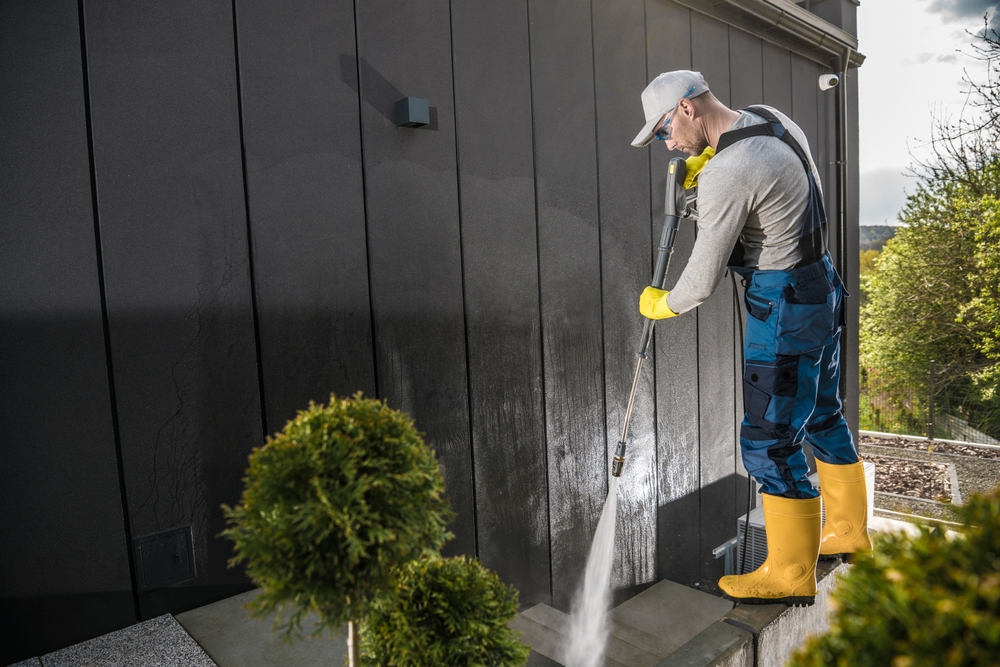
Prioritising Safety: Handling Chemicals with Care
When it comes to cleaning concrete, it’s important to understand that the chemicals involved require careful handling. This isn’t something to ignore; it’s about taking a responsible approach. Let’s look at some essential safety considerations.
Firstly, when dealing with these chemicals, appropriate protective gear is a must. Safety glasses, gloves, and long-sleeved clothing are important for preventing potential harm. These chemicals are engineered to tackle tough stains, which means they can be equally harsh on your skin or eyes.
Ventilation is another important factor to consider. If you’re cleaning an indoor concrete area, ensure proper air circulation. Don’t seal yourself in! Make sure your doors and windows are open. These fumes can be potent, so maintaining good ventilation is crucial to avoid inhaling them.
Moving on to application, it’s important to follow the instructions closely. Yes, it might seem as exciting as watching paint dry, but accurate measurements matter! Using too much of the chemical can damage your concrete, while too little might not yield effective results.
If accidental contact occurs with your skin or eyes, you need to act quickly. Flush the affected area with plenty of clean water immediately and seek medical assistance if required.
Handling concrete cleaning chemicals requires a cautious approach. So, prioritise your safety, adopt smart practices, and use high-quality protective gear. Following these guidelines, you’ll have your concrete looking pristine and well-maintained without any risks to your wellbeing.
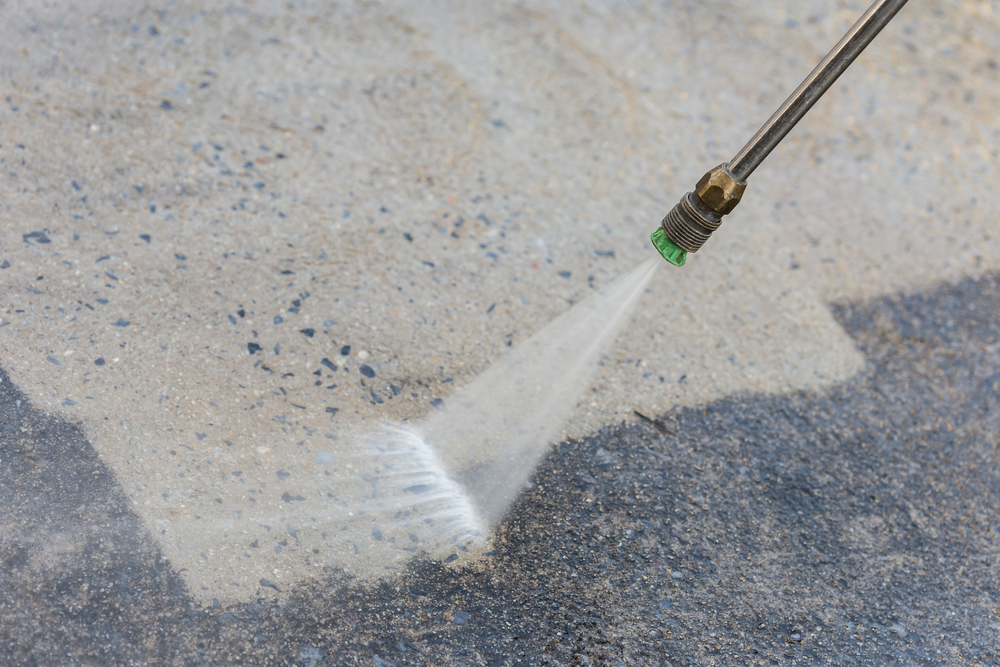
What Chemicals Should I Use For Pressure Washing Concrete?
Pressure washers stand as a proven technique for revitalising concrete surfaces. A pressure washer’s formidable force can eliminate persistent dirt and stains that have sunk in the concrete over time, resulting in a refreshed appearance.
For an amazing result, you can mix pressure washers with concrete cleaners and degreasers. These specialised formulations are engineered to strip oil-based stains, dirt, and grime from concrete. They have the potential to turn a labour-intensive job into a more manageable task.
It’s important to know that not all concrete cleaners and degreasers are created equal. Their efficacy hinges on variables like stain type, how porous concrete is, stain age, and local climate conditions.
To provide a starting point, here are some factors to consider when choosing a concrete cleaner or degreaser for use with a pressure washer:
- Double-Check the Label: Thoroughly read through the product information to check its compatibility with the specific stains you’re dealing with. Some products are great at addressing oil-based stains, whereas others are more effective at handling organic stains like mould or mildew.
- Environmental Impact: Whenever possible, opt for more environmentally friendly alternatives. Certain cleaners and degreasers can contribute to damage to the local ecosystem.
- Spot Testing: Exercise caution by conducting a spot test in an inconspicuous area to ensure the cleaner doesn’t induce discoloration or damage to the concrete.
Frequently Asked Questions
Hydrochloric acid–often known as muriatic acid–can be a valuable asset for getting rid of deep-seated stains. However, it’s important to exercise caution while using it. Incorrect use or a overly concentrated formula can potentially overstrip the concrete’s top layer, resulting in a splotchy, discoloured appearance. The dilution ratio of water and acid and thorough rinsing with fresh water are key steps to prevent such issues.
Good news: bleach is a cleaning product that is compatible with concrete, contrary to popular misconceptions. It serves as an effective solution against mould and mildew, but like any chemical cleaner, it requires cautious handling. Appropriate dilution and diligent rinsing following a brief application period are essential to avoid potential discoloration or damage.
If you’re looking for a shiny, attractive finish on your concrete, a high-gloss sealant is the best option. Beyond creating a glossy finish, this sealant functions as a protective shield against future stains and harm.
Prioritise safety above all else. Adequate protective gear, including gloves and safety glasses, are very important. Some of these chemicals are very potent, requiring responsible handling. Opt for a well-ventilated area to prevent inhaling potentially harmful fumes and minimise skin exposure.
White vinegar and baking soda make for an excellent eco-friendly formula for addressing minor stains, and without the strong smell of other cleaning solutions. They are also cheaper, meaning it can be a good first step to try. They’re not as potent as other chemicals, so they will likely need a bit more elbow grease to acheive the best result.
Get High Quality Concrete Tool Supplies Across Melbourne
While concrete cleaning might not be the most exciting project, with proper chemicals and techniques, you can quickly and easily have your concrete looking good as new. This will not only improve the aesthetics of your property, but also keep your concrete structurally sound for years to come. When choosing concrete cleaners, consider the nature of the stain, the existing finish or paint on the concrete and your comfort level with strong acids that can be present in the cleaning solution.
As one of the top concrete cleaning supplies providers in Australia, Australian Slate-Crete Supplies can provide you with any cleaning products and equipment you need, whether you need acid and cleaning chemicals, boots and personal safety supplies, or concrete sealers. Plus, if you have any questions or need more information, our friendly staff are more than qualified to help. Contact us today and let us help you get your concrete looking brand new again.
-
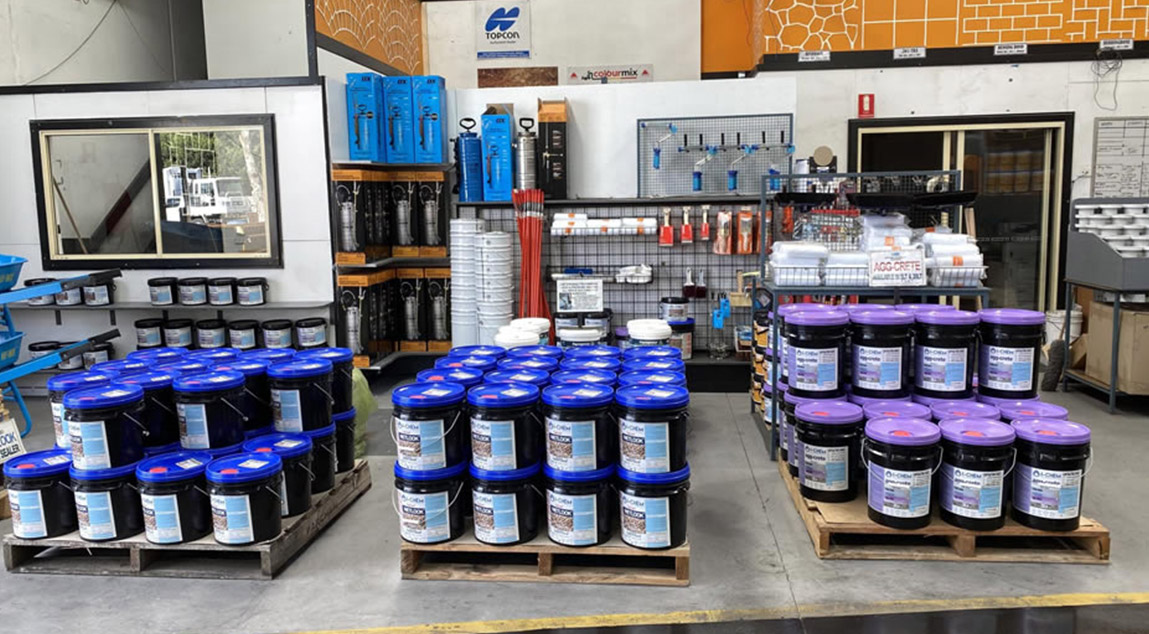 February 4, 2022Sandstone Concrete Stencil
February 4, 2022Sandstone Concrete StencilDo you want to add a touch of luxury and elegance to your concrete projects? If so, then consider using sandstone concrete stencils!
Read More -
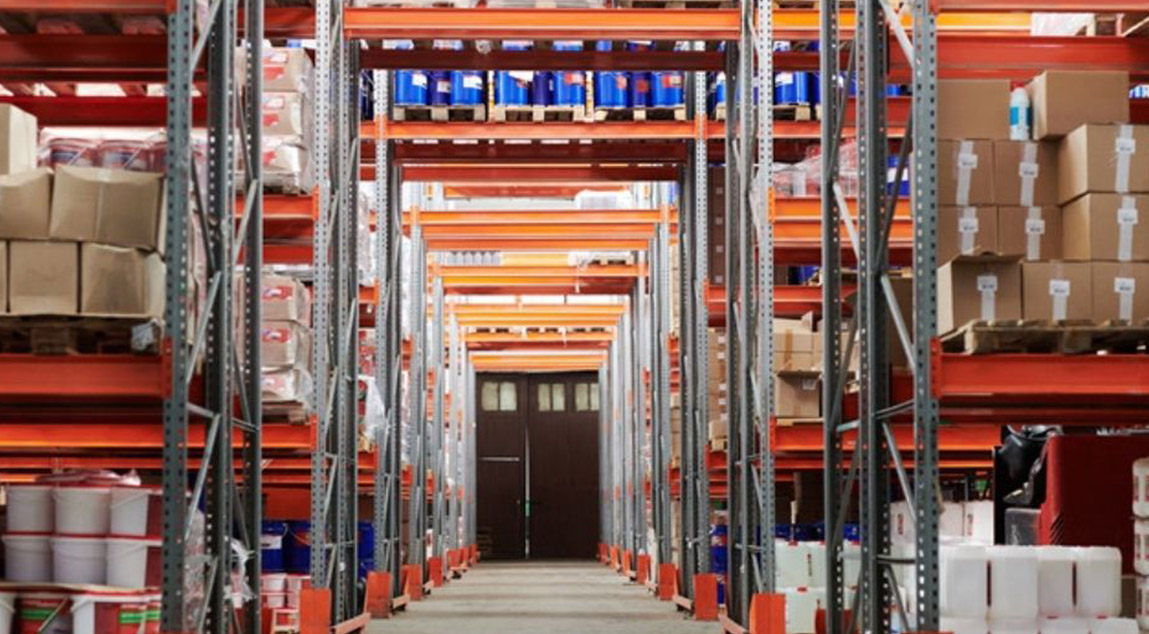 February 4, 2022Gloss Brick Sealer
February 4, 2022Gloss Brick SealerGloss brick sealer is a wonderful material for adding a brilliant shine to your brick slip wall feature.
Read More -
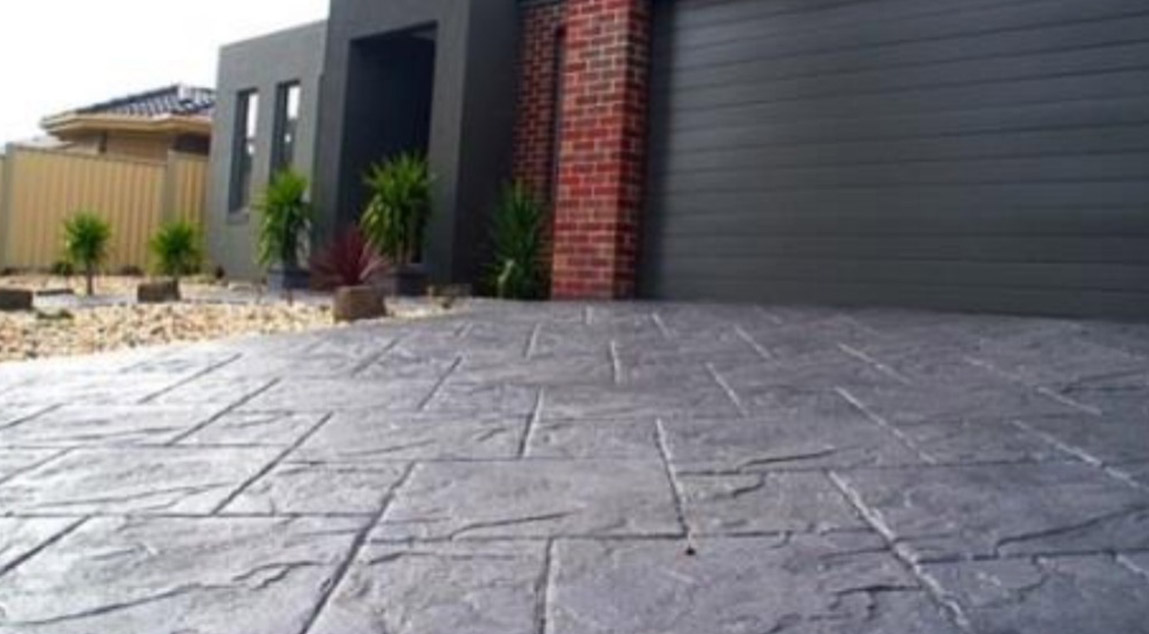 February 4, 2022Bluestone Concrete Sealer
February 4, 2022Bluestone Concrete SealerIn a broad sense, the term “bluestone” is sometimes used to refer to a variety of stones. It’s a marketing term rather than a geological one.
Read More
